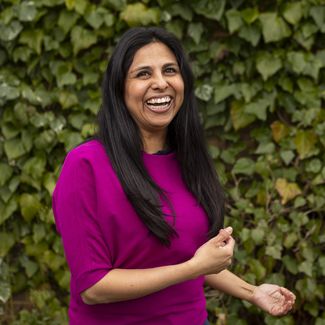
Marketer Of The Week
Benazir Barlet-Batada, Mondelez International
Cadbury's marketer discusses what effectiveness means for her brands
20 October 2022
Marketing is not an easy job. And good marketing, in a truthful and relevant way, is even harder. At Creative Salon we put a spotlight on the best people, the best businesses and the best work - all in support of commercial creativity, that can clearly demonstrate its value in the boardroom.
This week our Marketer of the Week is Benazir Barlet-Batada, senior marketing director at Mondelez for the UK. Her agency VCCP won the IPA Effectiveness Grand Prix for its work for Cadbury's, rebuilding the brand and increasing annual revenue by £261 million and becoming Britain’s fastest growing grocery brand – worth over £1.4 billion per year.
A great achievement for any brand and its marketing leaders - a robust demonstration of an effectiveness framework that joins up the dots and links the commercial, growth, marketing and communications, and creative agendas.
We spoke to Benazir about what effectiveness means to her:
Creative Salon: Effective marketing reminds us of the power when advertising, brand and business work together. However, marketing effectiveness (as a concept) varies in meaning from business to business and marketer to marketer. Is that a challenge?
Benazir Barlet-Batada: Not really! For me, great marketers have ambidextrous minds. They can do both the logical and the creative. They can take the rational steps and make the lateral leaps.
They combine commercial acumen with audience empathy.
They can do soft skills and they can do hard decisions.
And the truth is, you can find out quite quickly if they’ve got all this, however they define effective marketing.
CS: When discussing effectiveness, both brands and agencies talk about establishing an effectiveness culture. What does an effectiveness culture mean? And where does that sit within a brand or a business?
BB: Great question. The engine of an effectiveness culture will be a motivated Consumer Insights team and Category Development team keen to give their data and insights the visibility it all deserves.
It also requires buy-in from the top, with management showing appreciation that numbers can both inform strategy, and measure its successful implementation.
In some ways, an effectiveness culture is about doing the fundamentals well: making sure objectives are well-articulated; making sure KPIs are directional and inspiring; and ensuring the right measures and methodologies will accompany any marketing activity.
But perhaps the best way to sum up an effectiveness culture is in the less formalised, day-to-day habits: in hearing people begin conversations with colleagues around the numbers; in knowing that when senior people ask more junior colleagues in the corridor questions like “How are things on brand X?” the answer will probably include some reference to results - not just day-to-day ‘project development challenges’.
These little habits can’t be overtly forced on people but can be role modelled in senior leadership behaviour.
CS: How do you track effectiveness? What are the metrics used?
BB: We track fundamental commercial measures you’d expect: value and volume sales, penetration, value share, average weight of purchase - broken down across retail partners, online/offline and so on.
We use a series of ongoing ‘soft measures’ to assess brand health, combined with specific campaign evaluations to understand the effect of communications.
CS: For Cadbury’s, is measuring effectiveness a process (an in-built mechanism) or is it done on an ad-hoc, campaign-by-campaign basis?
BB: Both to be honest. In many ways, it’s a process - because you need consistency and continuity to truly measure effectiveness over time. Consistent metrics, regular survey waves, repeated methodologies.
That said, we also plan out in advance a series of bespoke campaign evaluations, so we can get a more detailed read on our main activity.
CS: What advice would you have for our industry when it comes to understanding effectiveness?
BB: It’s the classic advice to balance short- and long-term measures.
You do need to secure some quick wins to prove to colleagues that taking an enhanced interest in understanding effectiveness is reaping rewards, but at the same time you need to ensure you don’t get hooked on the buzz of immediate data (as often that data isn’t the most insightful).







